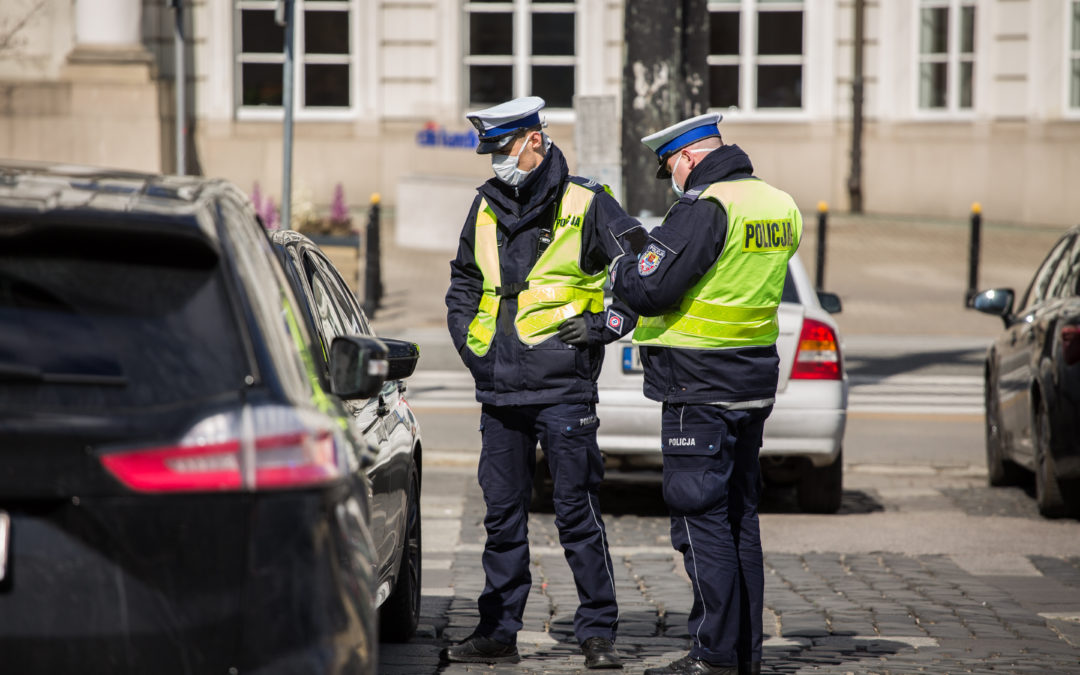By Mikołaj Małecki (tekst dostępny również w języku polskim)
One of the obligations of public authorities is to protect the safety of citizens. However, the actions of all institutions of a democratic state should be founded on and limited by the law. This principle is clearly set out by the Polish constitution. It also stipulates that restrictions on individual rights and freedoms must be proportional to the threat. Additional restrictions may result from an extraordinary situation, as described in the constitution. The three “extraordinary measures” – martial law, state of emergency, and state of natural disaster – certainly include the danger of an infectious disease spreading and the COVID-19 epidemic.
A virus epidemic is a force that is difficult to control and thus justifies use of extraordinary constitutional measures and introduction of additional restrictions on human rights and freedoms. This extraordinary situation gives the government greater “liberties” – albeit always within the confines of the rule of legalism – to achieve its objective and seek to bring the epidemic under control.
Is the COVID-19 epidemic an extraordinary situation? Just look around and you can see that it is. The proof is in the statistics of infections and deaths, the extent of quarantine, restrictions on movement and inconveniences in everyday life. But the Polish government has a different view – for political reasons, with the forthcoming presidential elections in mind, it does not want to apply the constitution and declare an extraordinary measure, because that would automatically postpone those elections.
The political authorities have therefore taken “liberties” without formally declaring the extraordinary measure that would justify them. Fundamental civil rights have been significantly restricted: the possibility of leaving home, a ban on gatherings, a prohibition on entering forests, parks and other green spaces, closing shops, cinema and restaurants. Yet all this without saying the obvious: that this is a state of natural disaster as identified in the constitution. The crisis is being dealt with in an unconstitutional, and thus unlawful manner.
Since officially no “extraordinary” measure has been applied, all the restrictions in force should be assessed in the light of the prohibitions and limitations foreseen in the constitution for an “ordinary” situation. From this perspective, of course, they are unproportional.
Leading Polish lawyers have pointed to evident violations of the constitution regarding freedom of movement, freedom of assembly, the inviolability of the home, freedom to conduct business, and personal security. Some of the restrictions violate the principle of equality before the law, such as the ban on under-18s leaving the home unaccompanied. This restriction has no substantive justification. Some have been introduced as faits accomplis, such as the closing of cemeteries or prohibition on entering forests, despite the lack of legal foundations for their implementation.
Poland introduces further coronavirus restrictions because public have not been “disciplined enough”
The restrictions on human rights and freedoms were introduced by a decree of the Minister of Health, followed by a regulation of the Council of Ministers from 31 March 2020 and 10 April 2020. And yet the constitution states that such far-reaching restrictions can only be introduced by a law passed in the parliament – a higher-level legislative act than a regulation. Many of the articles in the regulation are in contravention of delegated legislation.
One example of this dysfunctional lawmaking is the obligation to wear a protective mask in all public places. The law that was applied makes this mandatory only for people who are ill or suspected to be infected. There is no legal foundation for compulsory wearing of masks. But if an extraordinary measure such as a state of natural disaster were introduced, it would be fully within the law – yet this is something the political authorities do not want to do.
Many of the laws do not fulfil the constitutional standard of precision, which creates the risk of abuses from the police. The case of the man fined 5,000 zloty for going to a shop for an “inessential” product will go down in history. The law states that movement in public places is justified by an essential need involving satisfying everyday needs. The police have therefore taken it upon themselves to judge whether items purchased in a shop are essential (no punishment), or not essential, in which case a citizen can expect a fine ranging up to 30,000 zloty. This situation does not comply with the standards of a democratic state.
The anti-coronavirus restrictions are not just prohibitions and limitations, but also significant punishments for breaking the regulations. For example, for entering a prohibited area such as a park or river embankment, one can be fined at least 10,000 zloty. Failure to keep a distance of two metres from another person can cost 5,000 to 30,000 zloty. And this is for people who are not under quarantine, not infected, and not suspected of being infected.
The procedure followed for imposing the sanctions administered during the state of epidemic makes them unconstitutional. Those who drew up the regulations chose not to sanction violations of the law using the classical path foreseen by criminal law, which gives citizens the right to a fair trial. The punishments are imposed by administrative procedure: administered by an official, often without evidence proceedings and without a hearing. The decisions are immediately enforceable. Although people have the right to an appeal, this does not delay the punishment – fines must be paid within seven days. Furthermore, administrative liability does not require imputation of guilt. It is strict liability, without the guarantees characteristic of criminal law.
Most significantly, however, the restrictions currently in operation are actually more extraordinary than the equivalents for two constitutional extraordinary measures, state of emergency and state of natural disaster, under which punishments amount to maximum fines of 5,000 zloty or imprisonment, which can only be imposed by a court. The current financial penalties are at least 5,000 zloty, and their imposition is decided by a state official. Even declaration of an extraordinary measure would not bring such repressions.
With an extraordinary measure, the legislature can limit individual rights and freedoms to a wider extent than is possible during the ordinary operation of the state. Currently, things are topsy-turvy: the balance is awry between the actually more severe repressions of the “ordinary” mode and those for “extraordinary” sanctions, foreseen for identical actions, protecting identical legal interests and punished for identical reasons. There is no justification for these differences.
An ordinary situation justifies using ordinary measures to protect human rights and freedoms, including the ordinary sanctions foreseen for given acts when the state is functioning ordinarily. If the current state of epidemic is not an extraordinary situation – as government representatives, the prime minister and ministers stubbornly insist – there is no basis for repressing citizens with extraordinary sanctions. For this reason too, the currently binding financial penalties are not proportional, not rational, not appropriate and not necessary in the light of the standards of the constitution.
The government’s assessment of the current situation does not prevent citizens from exercising their rights before a court. The restrictions of the state of epidemic will be analysed by courts for long months, or even years. The courts will be tied up with the regulations of the constitution, testing the legality of bans, and ruling on whether they were within the delegation set out in the law. They will judge whether an extraordinary measure should have been introduced in Poland, such as a state of natural disaster, and whether it was in fact introduced, given the scale of restrictions on civil rights and liberties. They will adjudicate on the size of penalties and whether citizens were denied the right to a fair trial.
It is to be hoped that all this will be decided by an impartial and independent court. But this is not certain. The actions of the political authorities in Poland before the coronavirus epidemic successively sought to bring independent judges and courts under their control. The Constitutional Tribunal has ceased to exist, and this month, the battle for the Polish Supreme Court will get underway – which the new judges chosen by the politicised National Council of the Judiciary will seek to dominate.
So there is no guarantee that citizens will encounter justice from an independent judge. If necessary, they can exercise their right by going to an impartial court according to the guarantees specified by the European Court of Justice. Yet not all these legal intricacies can be resolved in a quick and straightforward way.
This means that after the virus threat subsides, the threats to the rule of law in Poland will remain. In fact, the coronavirus restrictions will destabilise the legal system. At present, the risk of legal chaos that awaits us is difficult to fathom.
Main image credit: Adam Stepien/Agencja Gazeta





















